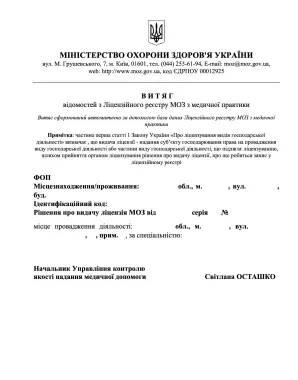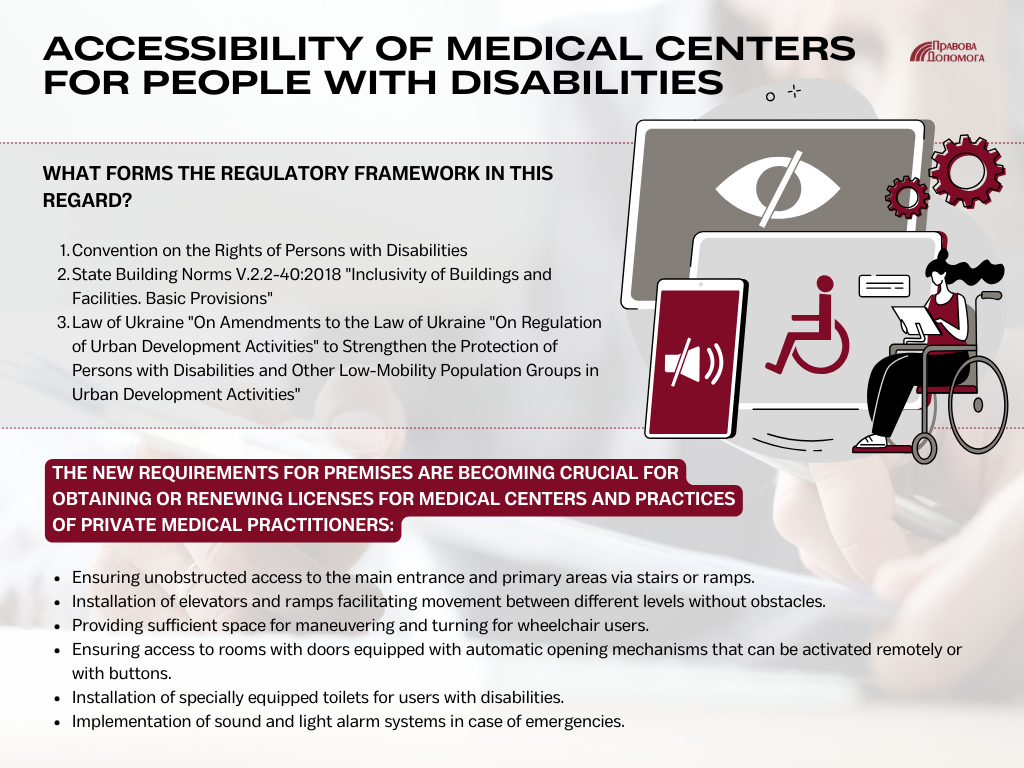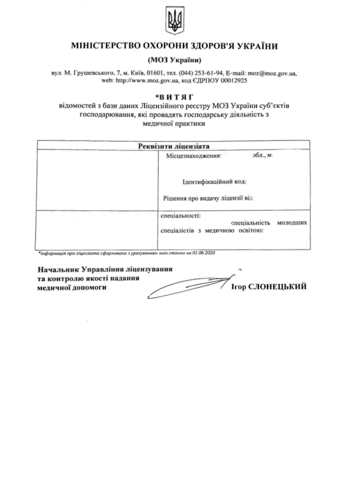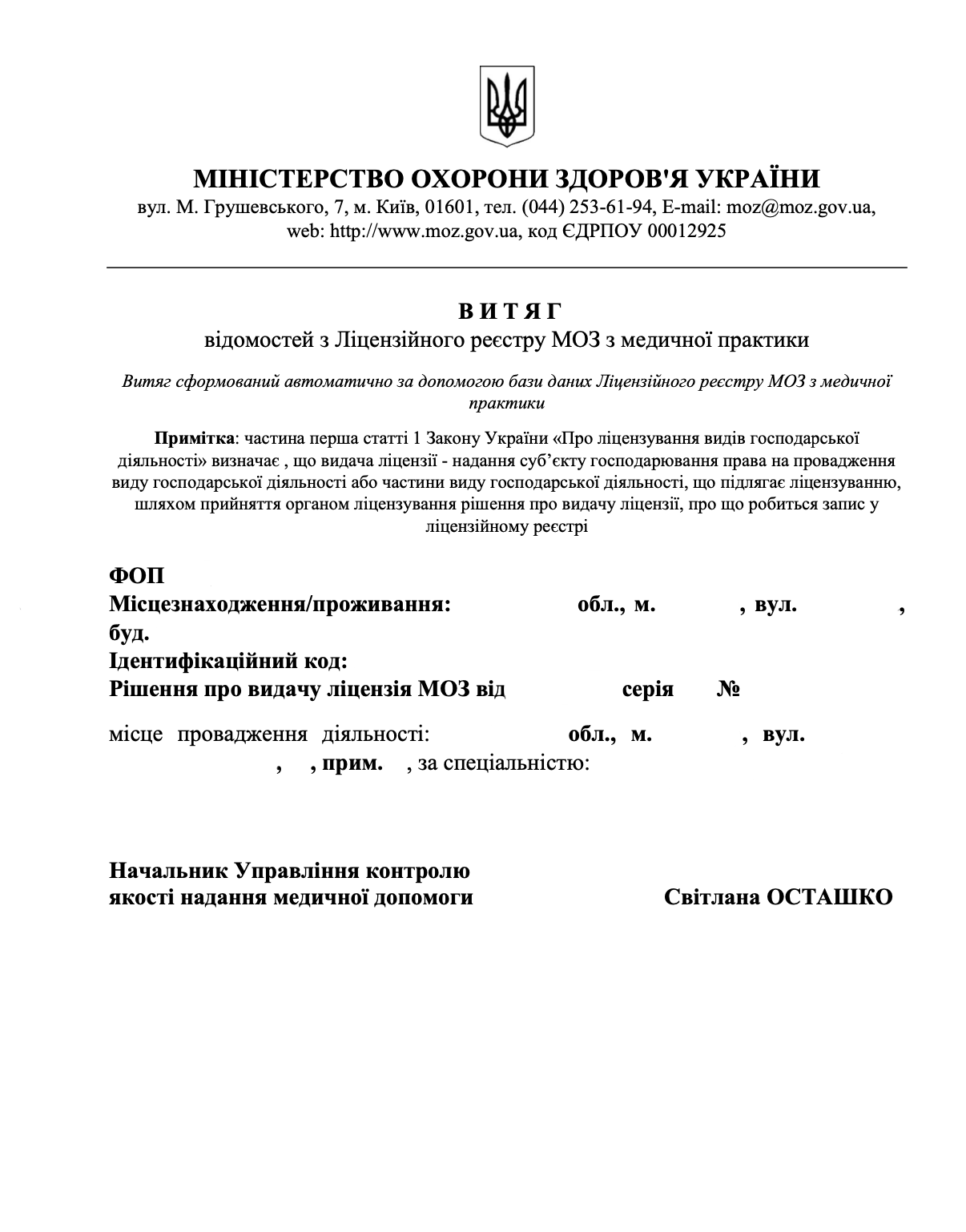Documents on Inclusivity for Medical Centers and Private Medical Practitioners: Ensuring Accessibility of Medical Centers for Persons with Disabilities
Cost of services:
Reviews of our Clients
…we can confidently recommend the lawyers of Law firm «Pravova dopomoga» as reliable legal partners on the matters of medical practice licensing and other procedures related to the Ministry of Health of Ukraine.
... Having used the services of the Law Firm "Pravova dopomoga", we managed to solve our problems, as well as found a qualified and reliable partner.
Recent changes in Ukrainian legislation have placed new demands on medical centers and practicing physicians operating as private medical practitioners regarding the inclusivity of their premises. These changes significantly impact the licensing of medical practices and require specific measures to ensure accessibility for all population groups, particularly for persons with disabilities.
Today, both current license holders and those seeking to license medical practice are confronted with several questions arising from the recent amendments in Ukrainian legislation regarding the inclusivity of premises:
- What specific requirements apply to medical centers concerning the inclusivity of their premises?
- How quickly must premises be adapted to meet new inclusivity requirements, and what strategies can expedite this adaptation process to meet new standards?
- Where can one obtain an assessment of a medical center's accessibility for persons with disabilities?
- What risks might arise for medical institutions that fail to meet the new inclusivity requirements?
- What measures should be taken to avoid the risks of license revocation and ensure compliance with new requirements for medical institutions?
In this article, we will address these questions, discuss the essence of these changes, and, most importantly, explain how to mitigate risks associated with the activities of medical institutions resulting from these innovations. We will cover key aspects of ensuring compliance of buildings and structures with accessibility requirements and clarify why obtaining relevant documents on inclusivity has become an integral part of modern medical practice.
With over 15 years of practical experience in this field and a track record of successfully acquiring more than 80 licenses in just the last 3 years, you can trust that we possess a thorough understanding of medical law. We are adept at navigating complex situations, ensuring compliance, and rectifying any issues, even if your documents are not initially in perfect condition.
You may also like: Changes in Licensing Regulations for Medical Business Operations
Accessibility of Hospitals for People with Reduced Mobility: Key Reasons for Changes
Recent changes in licensing conditions are occurring in the context of the rapid development of international quality standards in healthcare. Ukraine is aiming to join the EU, making the implementation of such standards a priority, especially as the number of individuals with reduced mobility, including persons with disabilities, unfortunately, continues to grow.
Therefore, it is important to note that if anyone considers these changes as temporary measures and hopes for a softening or reduction of requirements, this is an unlikely scenario. This is because the changes are part of the "Barrier-Free" program – an initiative by the First Lady of Ukraine, Olena Zelenska, which is included in the National Strategy for Creating a Barrier-Free Environment in Ukraine by 2030. Thus, it is crucial to understand that these measures are part of a long-term strategic plan in Ukraine, and requirements are likely to only increase.
According to the approved changes in licensing regulations, Medical Centers and Private Medical Practitioners must comply with European standards for inclusivity of premises. This means that buildings and facilities must be adapted to ensure safe and convenient access for all patients, including those with limited mobility. The changes take effect from March 30, 2024, so it is essential not to waste time and start adapting premises to the new requirements now to ensure the accessibility of the medical center for people with disabilities.
Please note that the changes apply to all medical institutions and practices, regardless of their level of experience or size. Ensuring inclusivity becomes a necessary condition not only for obtaining a license for medical practice but also for maintaining an existing license and the ability to provide medical services in the future.
Accessibility of Medical Centers for People with Disabilities: What Does the Law on Premises Inclusivity Provide?
The recent changes in licensing conditions are geared towards enhancing the quality and accessibility of healthcare for all segments of the population, fostering the creation of a more inclusive society where everyone can access necessary medical assistance without limitations or barriers. What forms the regulatory framework in this regard?
- Convention on the Rights of Persons with Disabilities: An international document that sets standards for the rights of individuals with disabilities and calls on participating states to take measures to safeguard these rights.
- State Building Norms V.2.2-40:2018 "Inclusivity of Buildings and Facilities. Basic Provisions": This regulatory document outlines the fundamental requirements for the inclusivity of buildings and facilities, with the aim of ensuring access for all segments of the population, particularly people with disabilities.
- Law of Ukraine "On Amendments to the Law of Ukraine "On Regulation of Urban Development Activities" to Strengthen the Protection of Persons with Disabilities and Other Low-Mobility Population Groups in Urban Development Activities": This legislation is designed to enhance the protection of individuals with disabilities and other low-mobility groups in urban development activities by introducing new legal provisions and improving oversight mechanisms.
The new requirements for premises are becoming crucial for obtaining or renewing licenses for Medical Centers and practices of private medical practitioners. Key aspects to consider when adapting premises include:
- Ensuring unobstructed access to the main entrance and primary areas via stairs or ramps.
- Installation of elevators and ramps facilitating movement between different levels without obstacles.
- Providing sufficient space for maneuvering and turning for wheelchair users.
- Ensuring access to rooms with doors equipped with automatic opening mechanisms that can be activated remotely or with buttons.
- Installation of specially equipped toilets for users with disabilities.
- Implementation of sound and light alarm systems in case of emergencies.
However, completing all the mentioned tasks does not automatically qualify the premises as accessible for People with Disabilities (PWDs). To confirm that the hospital can indeed serve individuals with limited mobility, an official document confirming this is required. This involves a special examination and technical inspection of the premises, the result of which is an expert opinion on the accessibility of the medical institution for low-mobility population groups.
Obtaining an Expert Opinion on the Accessibility of a Medical Center for People with Limited Mobility
Who can conduct a technical assessment of accessibility? An individual with a certification as an expert in building and structure assessment, responsible for determining the accessibility of premises for people with limited mobility. This expert prepares a report on the accessibility of premises by conducting a survey to evaluate the building's compliance with legislative requirements. A certified specialist conducts a comprehensive analysis of the property, including checking the documentation:
- Technical passport;
- Floor plan and layout of the premises;
- Technical report.
Additionally, necessary measurements and photography are taken. If the building meets the new standards and requirements, the expert issues a conclusion and report on the accessibility of the building for people with limited mobility.
You may also like: Documents for Healthcare Facilities: Why Do They Matter?
What awaits medical institutions that do not meet the accessibility requirements for people with disabilities?
The risks of not meeting the inclusivity requirements for hospital premises for individuals with disabilities can be substantial for medical centers and private healthcare practitioners. Among the potential consequences are:
- Fines, such as failing to comply with orders to rectify violations of licensing conditions, which could result in fines ranging from 8,500 UAH to 25,500 UAH.
- Sanctions from relevant regulatory bodies (for example, through orders or directives).
- Revocation of the medical practice license, which could occur after the issuance of a corresponding act based on the results of an inspection by the supervisory authority due to non-compliance with licensing conditions for conducting activities.
It is precisely because of these potential consequences that nearly all clients who have recently sought assistance from our company in obtaining a medical license have requested help in understanding the legal requirements regarding premises for conducting medical practice.
These inquiries stem from their understanding that it is always better to be proactive and, at present, to bring the premises into compliance or even to find a new location and obtain the necessary documents. If necessary, changes can be made to the existing license. Our company's lawyers will assist in assessing the risks in advance and developing the optimal solution to the problem.
We are prepared to offer the necessary support and consultations in this area, including recommendations on ensuring inclusivity and mitigating potential negative consequences. Additionally, we can assist in locating and engaging certified specialists who will conduct the required assessments and prepare conclusions and reports on the building's accessibility for people with limited mobility. Turn to our legal team for effective resolution of these matters, whether it's maintaining your current medical license or obtaining a new one, and for safeguarding your reputation in the medical field.
Feel free to call us or use the "Request a Call" feature to arrange a legal consultation. We are committed to ensuring a successful outcome!






